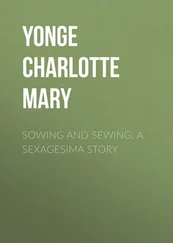Charlotte Yonge - Scenes and Characters, or, Eighteen Months at Beechcroft
Здесь есть возможность читать онлайн «Charlotte Yonge - Scenes and Characters, or, Eighteen Months at Beechcroft» — ознакомительный отрывок электронной книги совершенно бесплатно, а после прочтения отрывка купить полную версию. В некоторых случаях можно слушать аудио, скачать через торрент в формате fb2 и присутствует краткое содержание. Жанр: foreign_prose, literature_19, Европейская старинная литература, foreign_antique, на английском языке. Описание произведения, (предисловие) а так же отзывы посетителей доступны на портале библиотеки ЛибКат.
- Название:Scenes and Characters, or, Eighteen Months at Beechcroft
- Автор:
- Жанр:
- Год:неизвестен
- ISBN:нет данных
- Рейтинг книги:5 / 5. Голосов: 1
-
Избранное:Добавить в избранное
- Отзывы:
-
Ваша оценка:
- 100
- 1
- 2
- 3
- 4
- 5
Scenes and Characters, or, Eighteen Months at Beechcroft: краткое содержание, описание и аннотация
Предлагаем к чтению аннотацию, описание, краткое содержание или предисловие (зависит от того, что написал сам автор книги «Scenes and Characters, or, Eighteen Months at Beechcroft»). Если вы не нашли необходимую информацию о книге — напишите в комментариях, мы постараемся отыскать её.
Scenes and Characters, or, Eighteen Months at Beechcroft — читать онлайн ознакомительный отрывок
Ниже представлен текст книги, разбитый по страницам. Система сохранения места последней прочитанной страницы, позволяет с удобством читать онлайн бесплатно книгу «Scenes and Characters, or, Eighteen Months at Beechcroft», без необходимости каждый раз заново искать на чём Вы остановились. Поставьте закладку, и сможете в любой момент перейти на страницу, на которой закончили чтение.
Интервал:
Закладка:
‘It must have been a terrible shock.’
‘Such a loss—he was so very good and clever. Every one looked up to him—William almost as much as the younger ones. He never was in any scrape, had all sorts of prizes at Eton, besides getting his scholarship before he was seventeen.’
Whenever Lily could get Miss Weston alone, it was her way to talk in this manner. She loved the sound of her own voice so well, that she was never better satisfied than when engrossing the whole conversation. Having nothing to talk of but her books, her poor people, and her family, she gave her friend the full benefit of all she could say on each subject, while Alethea had kindness enough to listen with real interest to her long rambling discourses, well pleased to see her happy.
The next time they met, Lilias told her all she knew or imagined respecting Eleanor, and of her own debate with Claude, and ended, ‘Now, Miss Weston, tell me your opinion, which would you choose for a sister, Eleanor or Emily?’
‘I have some experience of Miss Mohun’s delightful manners, and none of Mrs. Hawkesworth’s, so I am no fair judge,’ said Alethea.
‘I really have done justice to Eleanor’s sterling goodness,’ said Lily. ‘Now what should you think?’
‘I can hardly imagine greater proofs of affection than Mrs. Hawkesworth has given you,’ said Miss Weston, smiling.
‘It was because it was her duty,’ said Lilias. ‘You have only heard the facts, but you cannot judge of her ways and looks. Now only think, when Frank came home, after seven years of perils by field and flood—there she rose up to receive him as if he had been Mr. Nobody making a morning call. And all the time before they were married, I do believe she thought more of showing Emily how much tea we were to use in a week than anything else.’
‘Perhaps some people might have admired her self-command,’ said Alethea.
‘Self-command, the refuge of the insensible? And now, I told you about dear Harry the other day. He was Eleanor’s especial brother, yet his death never seemed to make any difference to her. She scarcely cried: she heard our lessons as usual, talked in her quiet voice—showed no tokens of feeling.’
‘Was her health as good as before?’ asked Miss Weston.
‘She was not ill,’ said Lily; ‘if she had, I should have been satisfied. She certainly could not take long walks that winter, but she never likes walking. People said she looked ill, but I do not know.’
‘Shall I tell you what I gather from your history?’
‘Pray do.’
‘Then do not think me very perverse, if I say that perhaps the grief she then repressed may have weighed down her spirits ever since, so that you can hardly remember any alteration.’
‘That I cannot,’ said Lily. ‘She is always the same, but then she ought to have been more cheerful before his death.’
‘Did not you lose him soon after your mother?’ said Alethea.
‘Two whole years,’ said Lily. ‘Oh! and aunt, Robert too, and Frank went to India the beginning of that year; yes, there was enough to depress her, but I never thought of grief going on in that quiet dull way for so many years.’
‘You would prefer one violent burst, and then forgetfulness?’
‘Not exactly,’ said Lily; ‘but I should like a little evidence of it. If it is really strong, it cannot be hid.’
Little did Lily think of the grief that sat heavy upon the spirit of Alethea, who answered—‘Some people can do anything that they consider their duty.’
‘Duty: what, are you a duty lover?’ exclaimed Lilias. ‘I never suspected it, because you are not disagreeable.’
‘Thank you,’ said Alethea, laughing, ‘your compliment rather surprises me, for I thought you told me that your brother Claude was on the duty side of the question.’
‘He thinks he is,’ said Lily, ‘but love is his real motive of action, as I can prove to you. Poor Claude had a very bad illness when he was about three years old; and ever since he has been liable to terrible headaches, and he is not at all strong. Of course he cannot always study hard, and when first he went to school, every one scolded him for being idle. I really believe he might have done more, but then he was so clever that he could keep up without any trouble, and, as Robert says, that was a great temptation; but still papa was not satisfied, because he said Claude could do better. So said Harry. Oh! you cannot think what a person Harry was, as high-spirited as William, and as gentle as Claude; and in his kind way he used to try hard to make Claude exert himself, but it never would do—he was never in mischief, but he never took pains. Then Harry died, and when Claude came home, and saw how changed things were, how gray papa’s hair had turned, and how silent and melancholy William had grown, he set himself with all his might to make up to papa as far as he could. He thought only of doing what Harry would have wished, and papa himself says that he has done wonders. I cannot see that Henry himself could have been more than Claude is now; he has not spared himself in the least, his tutor says, and he would have had the Newcastle Scholarship last year, if he had not worked so hard that he brought on one of his bad illnesses, and was obliged to come home. Now I am sure that he has acted from love, for it was as much his duty to take pains while Harry was alive as afterwards.’
‘Certainly,’ said Miss Weston, ‘but what does he say himself?’
‘Oh! he never will talk of himself,’ said Lily.
‘Have you not overlooked one thing which may be the truth,’ said Alethea, as if she was asking for information, ‘that duty and love may be identical? Is not St. Paul’s description of charity very like the duty to our neighbour?’
‘The practice is the same, but not the theory,’ said Lily.
‘Now, what is called duty, seems to me to be love doing unpleasant work,’ said Miss Weston; ‘love disguised under another name, when obliged to act in a way which seems, only seems, out of accordance with its real title.’
‘That is all very well for those who have love,’ said Lily. ‘Some have not who do their duty conscientiously—another word which I hate, by the bye.’
‘They have love in a rough coat, perhaps,’ said Alethea, ‘and I should expect it soon to put on a smoother one.’
CHAPTER VII
SIR MAURICE
‘Shall thought was his, in after time,
Thus to be hitched into a rhyme;
The simple sire could only boast
That he was loyal to his cost,
The banished race of kings revered,
And lost his land.’
The holidays arrived, and with them the three brothers, for during the first few weeks of the Oxford vacation Claude accompanied Lord Rotherwood on visits to some college friends, and only came home the same day as the younger ones.
Maurice did not long leave his sisters in doubt as to what was to be his reigning taste, for as soon as dinner was over, he made Jane find the volume of the Encyclopædia containing Entomology, and with his elbows on the table, proceeded to study it so intently, that the young ladies gave up all hopes of rousing him from it. Claude threw himself down on the sofa to enjoy the luxury of a desultory talk with his sisters; and Reginald, his head on the floor, and his heels on a chair, talked loud and fast enough for all three, with very little regard to what the damsels might be saying.
‘Oh! Claude,’ said Lily, ‘you cannot think how much we like Miss Weston, she lets us call her Alethea, and—’
Here came an interruption from Mr. Mohun, who perceiving the position of Reginald’s dusty shoes, gave a loud ‘Ah—h!’ as if he was scolding a dog, and ordered him to change them directly.
Читать дальшеИнтервал:
Закладка:
Похожие книги на «Scenes and Characters, or, Eighteen Months at Beechcroft»
Представляем Вашему вниманию похожие книги на «Scenes and Characters, or, Eighteen Months at Beechcroft» списком для выбора. Мы отобрали схожую по названию и смыслу литературу в надежде предоставить читателям больше вариантов отыскать новые, интересные, ещё непрочитанные произведения.
Обсуждение, отзывы о книге «Scenes and Characters, or, Eighteen Months at Beechcroft» и просто собственные мнения читателей. Оставьте ваши комментарии, напишите, что Вы думаете о произведении, его смысле или главных героях. Укажите что конкретно понравилось, а что нет, и почему Вы так считаете.












